Windows has a lot of secret tools. Okay, maybe they aren’t really “secret”, but not too many people know them. That makes them an awful lot like secrets. Like the dictation tool in Windows. Windows has an in-built speech-to-text tool that you can use to type whatever you say. You don’t have to install any additional software.
So, imagine you’re in class or a meeting, and instead of taking notes manually, you could just turn on dictation and Windows will type everything for you. How easy would that make everything? Instead of trying to jot everything down, you could turn your complete focus on listening. This is just one example. Dictation comes in handy in so many other situations as well.
Sometimes, you’re trying to gather your thoughts on something. Maybe, you’re writing your bridesmaid or best man’s speech. Or you’re trying to get down the next chapter of your novel. You have the perfect line, maybe even a paragraph in your mind. But by the time you get to typing it, the train has already left the station. Some thoughts are better captured in conversation. With dictation, you can do just that.
What is Voice Typing in Windows 11?
The dictation tool, voice typing, speech to text – whatever you might want to call it does exactly what it says. It listens to what you’re saying and converts it to text in real-time. And it works with any text box. That’s right, you can use it in text editors, or compose boxes of a chatting app, to type a mail, comment, virtually anything.
And Windows 11 has improved the dictation tool even further. On Windows 10, you could dictate the text to Windows. But it just threw up the words on the screen in continuous mumbo-jumbo. The burden of editing fell to you. You had to make outlines yourselves and punctuate them accordingly.
The new Voice Typing tool in Windows 11 detects the punctuation in your tone and auto-punctuates the text.
There are a few catches though. It only works with certain languages. And you should be connected to the internet.
The list of supported languages include:
- English (US, Australia, Canada, India, United Kingdom)
- French (France, Canada)
- German (Germany)
- Italian (Italy)
- Portuguese (Brazil)
- Spanish (Mexico, Spain)
- Simplified Chinese
Using Voice Typing (Dictation) in Windows 11
Using the Voice Typing tool to dictate to Windows is pretty simple. Select the text box where you want to type. Essentially, your cursor should be in the text field, otherwise, you’d receive an error that you need to select a text box and try again.
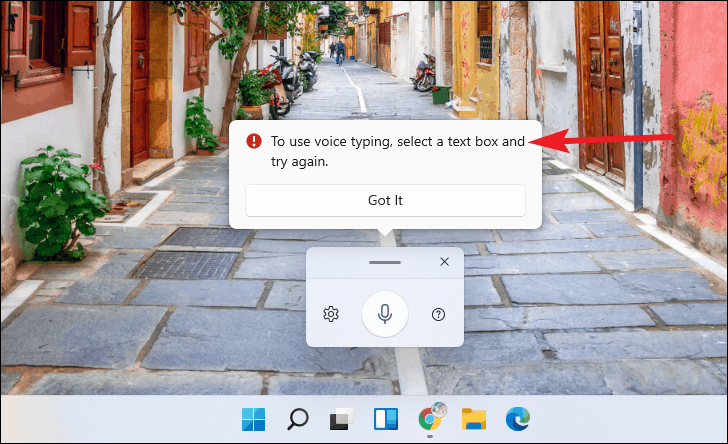
With your cursor in the text box, press the Windows logo key + H keyboard shortcut to launch the Voice Typing tool on the screen.
It is a little pop-up box you can move anywhere. If it’s obstructing your screen view, just click and hold the bar at the top to drag and move it around the screen.
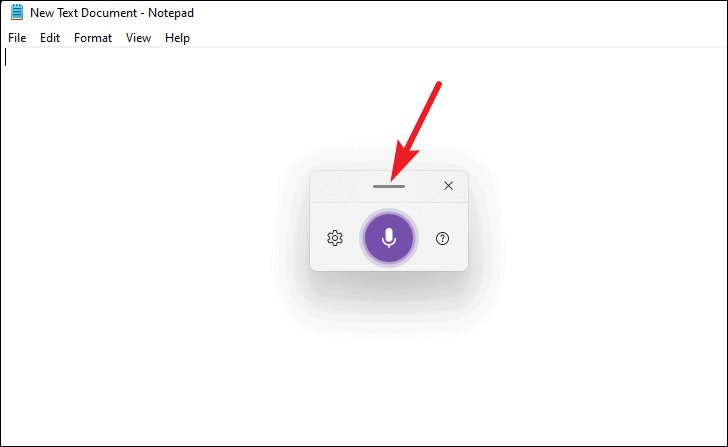
When Voice Typing for the first time on Windows 11, you’d have to turn on auto-punctuation. Go to the Voice to Typing pop-up, and click the ‘Settings’ (gear) icon within the box.
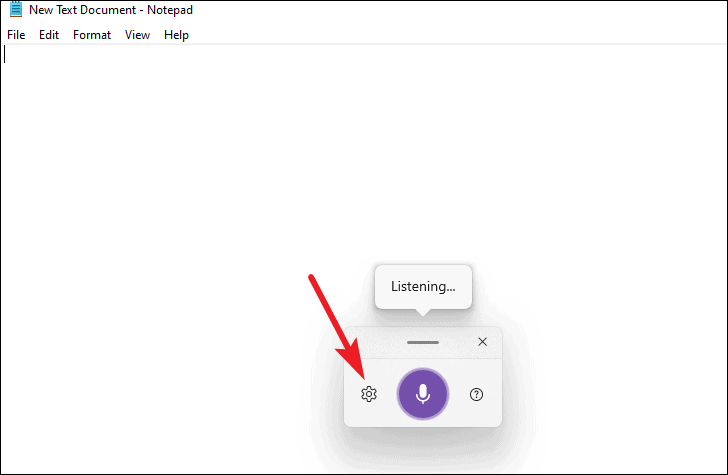
A menu will pop up. Turn on the toggle switch next to ‘Auto-punctuation’.
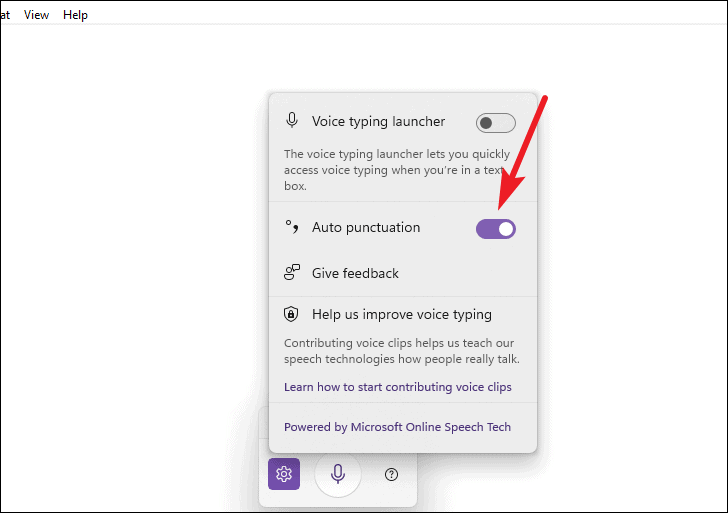
Now, while the tool is still active on the screen, you can either press Windows + H from the keyboard again or you can click the ‘Microphone’ icon to start dictating.
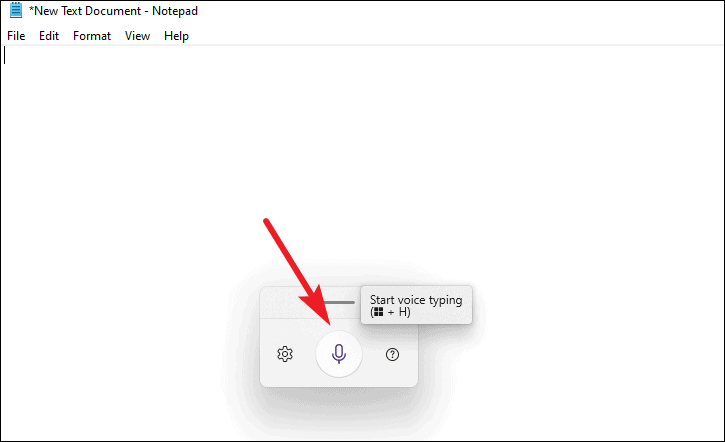
Note: When your PC is listening, the microphone icon color will be the accent color of your theme. And when not listening, it will be a plain white color.
To stop or pause dictation, either press the ‘Microphone’ icon or press Windows + H keys again or just say, “Stop Dictation”.
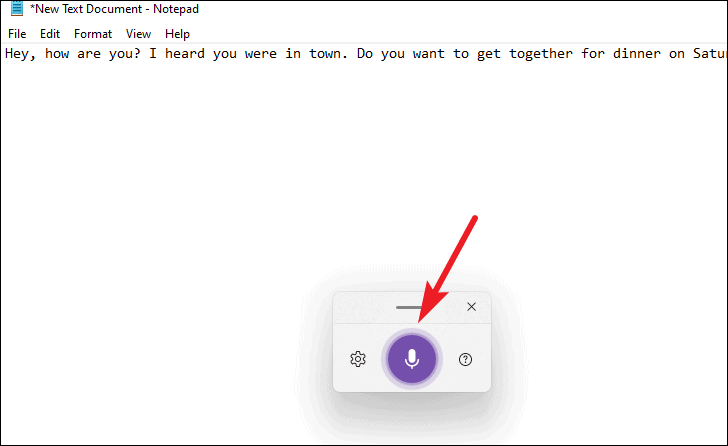
To close the Voice Typing tool, either press the ‘Esc key or click on the ‘Close’ button on the tool’s pop-up.
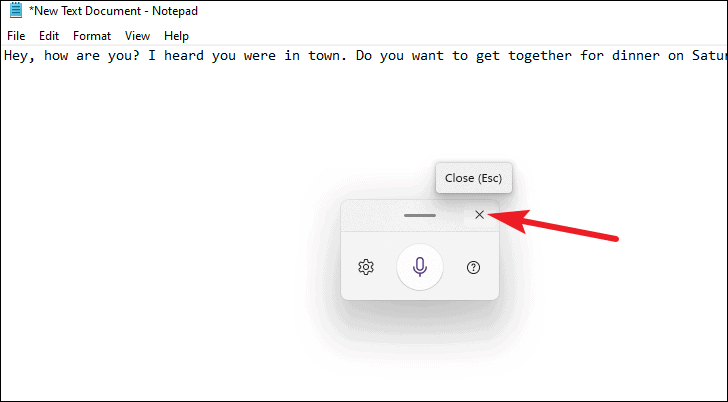
You can also enable the Voice typing launcher to automatically appear anytime you click inside a text field. If you plan to dictate often, you will find this very helpful to have the tool open and ready for dictating.
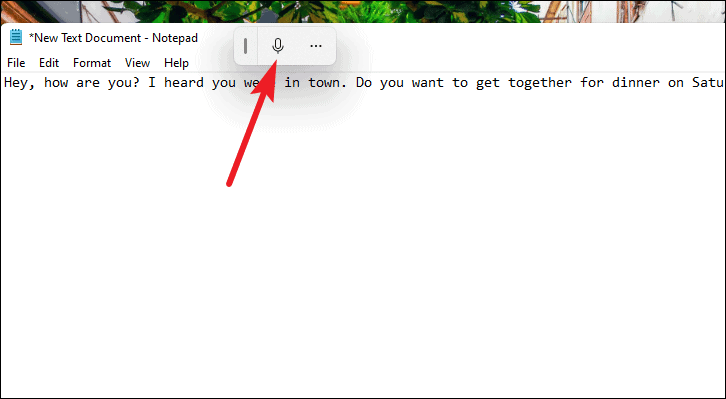
To turn on the Voice typing launcher, click the Settings gear icon in the toolbox. Then, turn on the toggle switch next to ‘Voice typing launcher’ option.
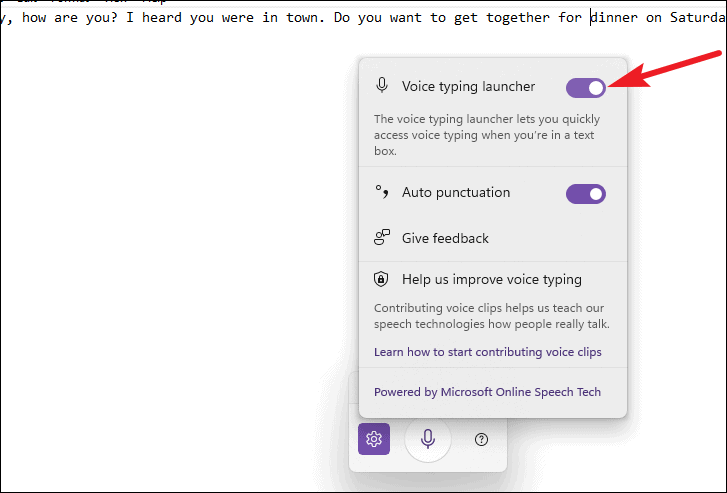
Useful Voice Commands to Help you Dictate Better
You can also use some Voice commands while dictating to go completely hands-free.
| Action | Command |
|---|---|
| Delete the most recent dictation result or currently selected text | Delete that; strike that |
| Delete a unit of text, such as the current word | Delete word |
| Select a specific word or phrase | Select word |
| Select the most recent dictation result | Select that |
| Select a unit of text | Select the <next three words>; select the <previous two paragraphs> |
| Clear a selection | Clear selection; unselect that |
| Move the cursor to the first character after a specified word or phrase | Go after that; move after word; go to the end of paragraph; move to the end of that |
| Move the cursor to the end of a unit of text | Go after word; move after word; go to the end of that; move to the end of paragraph |
| Move the cursor backward by a unit of text | Move back to the previous word; go up to the previous paragraph |
| Move the cursor to the first character before a specified word or phrase | Go to the start of the word |
| Move the cursor to the start of a text unit | Go before that; move to the start of that |
| Move the cursor forward to the next unit of text | Move forward to the <next word>; go down to the <next paragraph> |
| Moves the cursor to the end of a text unit | Move to the end of the word; go to the end of the paragraph |
Note: The words in bold are just placeholders. Replace them with similar words to get the results you want.
Dictating Symbols, Punctuation, and Numbers
You can also insert punctuation characters and symbols by simply dictating the symbol’s name. In Windows 11, no other command is required to dictate symbols, punctuation marks, and even letters and numbers.
| Symbols | Command |
|---|---|
| @ | At sign |
| # | Pound sign; number sign |
| $ | Dollar sign |
| % | Percent sign |
| ^ | Caret |
| & | And sign; ampersand |
| * | Asterisk |
| ( | Open parenthesis; left parenthesis |
| ) | Close parenthesis; right parenthesis |
| _ | Underscore |
| – | Hyphen; minus sign |
| ~ | Tilde |
| \ | Backslash |
| / | Forward slash |
| , | Comma |
| . | Period; full stop |
| ; | Semicolon |
| ‘ | Open single quote; begin single quote; close single quote; close single quote; end single quote |
| = | Equal sign |
| : | Colon |
| ? | Question mark |
| [ | Open bracket; open square bracket; left bracket; left square bracket |
| ] | Close bracket; close square bracket; right bracket; right square bracket |
| { | Open curly brace; open curly bracket; left curly brace; left curly bracket |
| } | Close curly brace; close curly bracket; right curly brace; right curly bracket |
| + | Plus sign |
| < | Open angle bracket; left angle bracket; less than sign |
| > | Close angle bracket; right angle bracket; greater than sign |
| “ | Open quotes; close quotes |
To enter a letter or number, simply dictate them without any need for additional comments.
Dictating your PC to type for you can be a real lifesaver. And with auto-punctation in Windows 11 Voice typing tool, you don’t even have an excuse to not want to use this feature.

